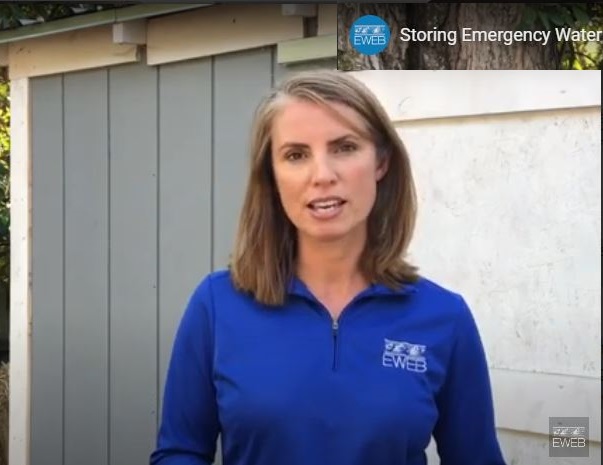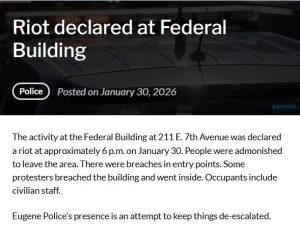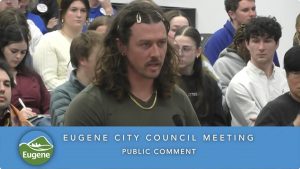EWEB: Prepare now for winter emergencies
4 min read
|
Getting your Trinity Audio player ready...
|
from Aaron Orlowski, Eugene Water & Electric Board
The recent rains remind us that winter is coming, and now is the time to prepare for potential storm-related power outages. This September during National Preparedness Month, EWEB encourages communitywide readiness.
In the event of back-to-back ice storms (like last year), or an even larger disaster like a Cascadia Subduction Zone earthquake, electricity and clean drinking water could be unavailable for an extended period.
EWEB joins the Oregon Department of Emergency Management in encouraging customers to prepare to Be 2 Weeks Ready—be self-sufficient for a minimum of two weeks. That means storing 14 days of water, food, medicine and other supplies. For a family of four, that’s 56 gallons of water.
Here are some water storage and treatment tips:
- Store water in a number of different locations such as under the sink, in the garage, a storage shed, or closet. Check out our video for tips on storing water when you don’t have a lot of space.
- Purchase bottled water from the store, or buy and fill your own containers.
- It’s safe to store water in cleaned and disinfected soda bottles, but do not use milk or juice containers for water storage.
- Learn how to clean and prepare water storage containers.
- Know how to treat water if necessary. Both the EPA & CDC recommend boiling or chlorinating “suspicious” water before use.
Emergency Water Stations
EWEB is developing neighborhood emergency water stations. Working with community partners, we now have six, fully operational emergency wells:
- Prairie Mountain School – 5305 Royal Ave.
- Howard Elementary School – 700 Howard Ave.
- Eugene Science Center – 2300 Leo Harris Parkway
- Lane Events Center/Fairgrounds – 796 W. 13th Ave.
- Sheldon Fire Station – 2435 Willakenzie Rd.
- YMCA / Roosevelt Middle School – 600 E. 24th Ave.
Plan how you would get to the nearest emergency water station and transport water in an emergency. You will need to bring your own container, and water obtained from an emergency water station will need to be treated prior to consumption.
Pledge to Prepare
To help customers, EWEB created the Pledge to Prepare program — a 12-month guide to getting two-weeks-ready. Each month, EWEB sends participants a new set of tasks to incrementally build a two-week emergency supply kit. Though many customers choose to begin the program in January, the best time to start preparing is now and the Pledge to Prepare program is structured in a way for customers to begin their preparedness journey at any time. The idea is to start small with a basic three-day kit, and then build it slowly over time.
In addition to a monthly task checklist, EWEB provides information on important safety topics, such as securing your water heater, water treatment in an emergency, and how to prevent frozen pipes.
EWEB also offers a zero-interest loan to help its electric customers purchase a backup generator or home battery storage system.
“While EWEB and other agencies play a critical role in response and recovery, individual and collective preparedness is vital to ensuring the community’s safety and resilience in a crisis,” said EWEB Public Information Officer Robyn Smith.
EWEB is investing in preparedness and resiliency by upgrading key pieces of electric and water infrastructure in the next 10 years.
EWEB will invest more than $600 million on electric infrastructure in the next decade, based on the utility’s most recent Capital Improvement Plan. Just under half of the projects outlined in the plan are considered risk-based, associated with reliability and resiliency enhancements due to the age of system and emerging risks to the electric system such as the Cascadia earthquake and wildfire.
And EWEB is investing more than $200 million in major water infrastructure projects with the goal of ensuring water access even during a major natural disaster.
EWEB is calling on the community to embrace the idea that preparedness is a shared responsibility.
“To truly safeguard our community, we need everyone to take part in the preparation process—families, neighbors, businesses, and local organizations,” said Smith. “By working together, we can create a safer and more resilient Eugene.”
September is an ideal time to start preparing for challenges ahead.
“We’re heading into winter storm season, and as we’ve seen in the last few years, severe weather can lead to multi-day power outages,” Smith said. “National Preparedness Month is the perfect time to begin building a kit, because you can get all the basics ready before winter, and then build on that momentum going into the new year.”
To join Pledge to Prepare and get started on your two-week emergency kit and to find more emergency preparedness tips and resources visit eweb.org/EmergencyPrep.




